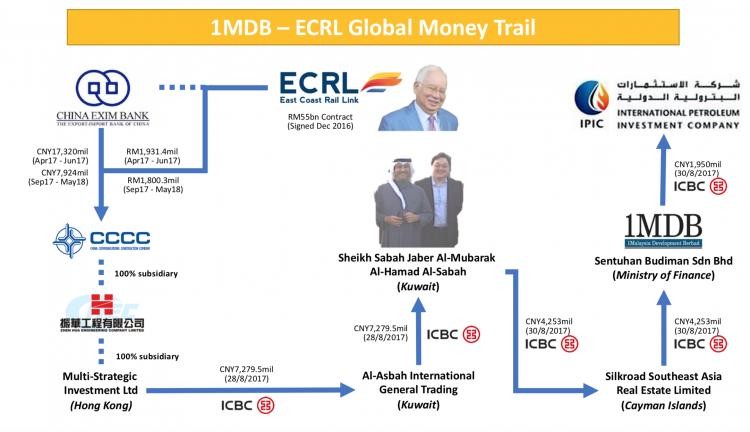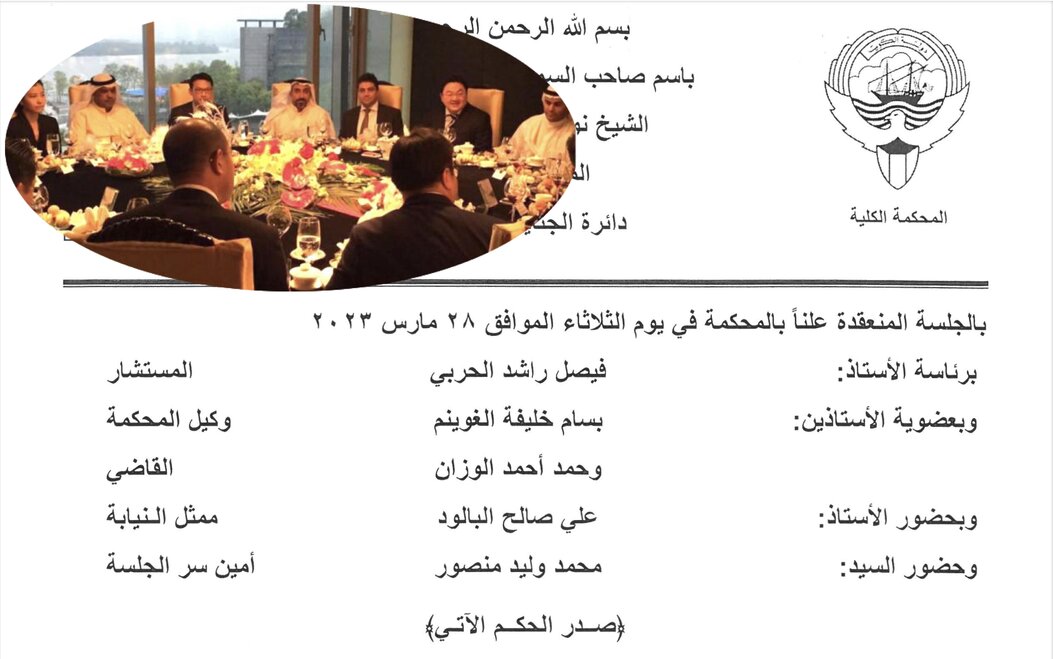Back in 2020, the finance ministry’s Tony Pua MP requested China, in view of its strong ‘anti-corruption’ stance, to assist Malaysia in investigating the 1MDB cover-up stage that had involved the theft of several more billion dollars through projects issued by the previous PM/MOF, Najib Razak, to major Chinese state-owned companies.
The money was then laundered through China’s largest ICBC Bank, mainly in Kuwait, during the period 2016-2017 before the advent of the PH government.
That request was greeted with silence as Pua produced a chart to show the critical role of Chinese institutions in Jho Low’s money laundering operations (Najib’s proxy) as he sought to continue to move Malaysia’s stolen cash around the globe.

Now fascinating new detail has emerged from the translations of the Kuwaiti judgement that last week found Jho Low and four named collaborators in his operations in the Gulf state guilty of organised crime.
It is revealed the criminal scheme was initiated at the highest levels by Najib himself, who sent a top delegation to meet with Chinese senior government officials in Beijing in early 2016 with the purpose of constructing a mechanism for raising money that could be back-channelled to ‘settle the debts’ owed by 1MDB and its subsidiary SRC.
The judgement first describes a sherpa meeting which took place between Najib’s private secretary and economics officials from China’s State Council which was attended by Jho Low. It was then arranged for two of Jho Low’s closest functionaries Terence Goh and Jerome Lee to be placed on the key council for managing Malaysia’s business relations with China.
Two sets of projects were agreed for this purpose, the expanded East Coast Rail Link and two pipe lines in Sabah. It was the government negotiators who settled on which Chinese companies would receive these projects, explains the Kuwaiti judgement, CCCC and CPP respectively.
The terms specifically included the “purchase by the Chinese government” at a high price of 1MDB’s debts:
“In June 2016 the Malaysian Prime Minister instructed his special officer, Datuk Amhari Effendi Nazruddin ‘Amhari’ to go to the People’s Republic of China to finalise investment deals between the two countries and his partner, the fifth accused [Jho Low] – a wanted criminal in crimes related to 1MDB – was assigned.
The deals included, for example, integrated investment projects and infrastructure construction in Labuan, construction of a multi-purpose oil pipeline in Peninsular Malaysia, study and construction of a high-speed rail system linking Kuala Lumpur, Bangkok and Thailand and prioritisation of state-owned projects in China.
Within the Trans Sabah Gas Pipeline (TSP) and ECRL (East Coast Rail Link) projects the purchase of the indebtedness of the company SRC (1MDB) would be purchased by the Chinese government at a high market value.
The fifth defendant [Jho Low] proposed to award the ECRL to CCCC and to settle the obligations of MEL (1MDB Energy Langat Ltd and (IMEL) 1MDB Energy) which are wholly owned by 1MDB. The state owned Assets Supervision and Administration Commission of the State Council of China (SASAC) proposed to the Government of Malaysia to award a letter of award to CCCC by the end of July 2016.
Following the meeting the fifth accused (Jho Low) submitted a report – believed to have been prepared before the meeting – to the Malaysian prime minister on the matters that were discussed in China and used his influence to appoint his well know associates Jerome Lee and Terrence Goh to the Malaysian-Chinese High Influenced Strategic Economic Commission to ensure the signing of the agreements for these projects between the governments of Malaysia and China. [translation of the judgement of the Kuwaiti court]
The judgement goes on to detail how Najib swiftly moved to quash internal Malaysian objections over the lack of open tendering for the rail project by side-lining the Malaysian Public Land Transport Authority and setting up another special purpose vehicle company MRLSB to implement the project.
Another key component of the scheme was the source of the money, which was to come in the form of a long-term loan from China to be paid back by the Malaysian taxpayer. The Chinese state owned Exim Bank was assigned for the task of raising the cash in both of the projects used to bail out Najib – ECRL and the Sabah pipeline.
On 21st October 2016 the Malaysian Prime Minister presented a memorandum at the weekly meeting of the Malaysian Cabinet and it was agreed to implement the two projects by MRLSB, the ECRL project cost was RM55 billion and CCCC was appointed the contractor. The financing of these projects was by the Chinese Bank (EXIM Bank of China) according to an agreement signed by the Malaysian Prime Minister during an official visit to China from 31st October to 5th November 2016. [translated]
Even before this date Sarawak Report had received leaks from outraged parties revealing the planned schedule for payments through CCCC out of the inflated contracts to cover 1MDB and Jho Low’s debts.
By September the funds had already started flowing into Jho Low’s money laundering ring which he had set up earlier in the year through the son of the then prime minister of Kuwait (now convicted to ten years along with the rest of the conspirators). A further $135 million dollars was due to arrive from October, presumably once the contracts were officially signed by the PM on his visit to Beijing.
Before signing the loan agreement between (MRLSB) and (EXIM) Bank and disbursing the loan, a financial working group agreement was signed between the company and the bank on 1st November 2016 in order to prove the bank’s commitment to providing the loan at a rate of up to 85% of the cost of implementing the project. (MRLSB) obtained a loan in the amount of RM39.1 billion from the aforementioned bank at 85% of the cost of the first phase of the project ….
The judgement therefore spells out exactly how the Chinese state machinery colluded with Najib to raise his $8 billion windfall from the ECRL project, much of which was to start funnelling through Kuwait to fund 1MDB’s outstanding debts .. along with the increasingly lavish lifestyles of the conspirators themselves.
Sarawak Report began lifting the lid on the Kuwaiti side of this money laundering operation in early 2020, bringing publicity that finally led to last week’s convictions of the perpetrators.
It had become clear that tying in all the transactions was another Chinese state backed entity, namely ICBC, the world’s largest bank, which facilitated all the transfers between the Chinese, Malaysian and Abu Dhabi entities through the new branch it had just opened in Kuwait (see chart).
The companies opened by Jho’s money laundering ring and fronted by Sheikh Sabah all maintained several accounts in different currencies at ICBC (avoiding dollars now that the international financial system had been alerted to the fraudsters from Malaysia) and transferred payments to other ICBC branches in Malaysia and Abu Dhabi.
Suspicious transfer alerts were raised by the local ICBC branch manager in Kuwait, the judgement says, however these were ignored given the powerful political influence of the royal Sheikh whose father was prime minister at the time.
Meanwhile, Najib moved to raise further cash from the pipeline projects:
The Ministry of Finance established a special purpose company to the MPP and TSGP [pipeline] projects, namely SSER. The contractor appointed to implement the project was CCP.. The Malaysian Prime Minister presented at the weekly meeting of the Council of Minister on 27th July 2017 a memorandum that included the cost of the two projects in the amount of six billion Malaysian ringgit and they were awarded to CPP in its capacity as the contractor…. During the meeting, the Prime Minister stated that the remaining debt of SRC in the amount of US132,022,500 will be taken over by CPP ….. The value of the contract signed with CPP is CY3,079,786,788 ($450m) while for the TSGP project, while for the MPP project the value of the signed contract is CY4,528,843,779 ($660m).
In September 2016, SRC contacted EXIM Bank. Then (SSER) submitted a loan request … equivalent to 85% of the value … for both projects (RM7977000000/ $1,81 bn) and the agreement was signed on 22nd March 2017……
Investigations revealed that some of the money from EXIM Bank to CCCC Company for the benefit of the ECRL project and to CPP in favour of the TSGP & MPP projects passed through several entities in Kuwait…..
What the above judgement shows, therefore, is the level of planning and complicity at the highest levels in which Najib was involved and used his personal interventions to achieve the post-1MDB cover-up involving further thefts to pay back the debts caused by the original looting of the fund.
The idea that he simply didn’t know about the thefts and believed that all the money arriving in his bank account came from a gift from the King of Saudi Arabia, which is the position he continues to maintain, is simply laughable. As ever, all is revealed in the cover-up.
Likewise, China’s silence in the matter is explained. This foreign super-power showed immediately willing to move to engage in this criminal conspiracy at the highest levels of government, lending the criminal Malaysian prime minister bail out cash with the clear strategic aim of achieving powerful leverage over the top decision maker in the country.
Malaysians should be under no illusions about the level of this betrayal now laid out in black and white in a court judgement in one country that became a third party participant in this affair.

